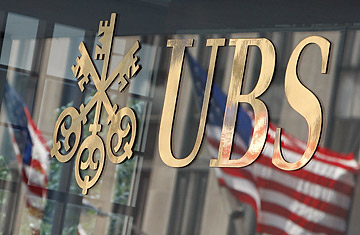
The U.S. flag is seen in a reflection outside the UBS offices in New York
After months of behind-the-scenes wrangling that threatened to strain relations between Switzerland and the U.S., the fate of secret Swiss bank accounts reportedly holding billions of dollars in undeclared assets is finally resolved.
Under an agreement announced by Swiss and U.S. authorities on Aug. 19, Switzerland's second largest bank, UBS, will disclose the names of approximately 4,450 American account holders suspected by the IRS of evading taxes. In return, the U.S. Justice Department will withdraw its lawsuit against the banking giant and stop demanding the names of 52,000 Americans accused of hiding assets in offshore accounts.
Citing the bank-client confidentiality that is guaranteed by the Swiss constitution, the Swiss government had forbidden UBS from complying with the Justice Department's demands and had threatened to seize UBS data to prevent the bank from handing accounts over to the Americans. Earlier this year, UBS had already released to the IRS the names of 250 suspected tax cheats and paid the U.S. government $780 million to avoid criminal prosecution for helping wealthy Americans hide $20 billion in undisclosed offshore accounts.
Under the terms of the new agreement, the IRS will submit a request to Swiss tax authorities to divulge within one year the names of clients suspected of stashing money in UBS to evade U.S. taxes. Account holders will be notified before their names are disclosed and will be able to appeal the decision in Switzerland's Federal Administrative Court. This approach, the Swiss government says, is in line with the existing law allowing the exchange of account information in cases of suspected criminal activity and also complies with the newly signed double-taxation treaty between the two countries, which stipulates that Switzerland will cooperate with the U.S. in investigating suspected cases of tax evasion.
In Switzerland, news of the settlement was greeted with relief. "The out-of-court agreement avoids a prolonged legal battle that would have had an uncertain outcome, and the solution found conforms entirely with prevailing Swiss law," the Swiss Banking Association (SBA), a trade organization for Switzerland's financial institutions, said in a statement. "This is of crucial importance because international clients rely very much on the predictability and stability of the Swiss legal system."
SBA stressed that the agreement does not violate Swiss banking-secrecy laws and that the privacy of clients who are not suspected of tax evasion or other forms of criminal activity is protected.
At UBS, which escaped a potentially lengthy legal battle in the U.S. and the possibility of a hefty fine, there is a determination to restore investor confidence. "We will comply with every law in every country where we operate," spokesman Serge Steiner told TIME. "And we are committed to winning back clients' trust by being profitable and providing excellent service."
The Swiss government, which yesterday put its 332.2 million UBS shares, valued at $5.6 billion, up for sale — a sign, market analysts say, that the government's trust in the bank's ability to raise capital has been restored — also expressed its satisfaction with the settlement. "We have managed to avoid a conflict between the sovereignty of two states," Swiss Justice Minister Eveline Widmer-Schlumpf told the press, while Finance Minister Hans-Rudolf Merz urged the country's banks to respect the law. "It's the least they can do," he said.
The long-term effects of the agreement on the Swiss banking industry, however, are difficult to predict, experts say. "The settlement is a success for Switzerland and its financial center because it takes away a lot of pressure," says Teodoro Cocca, a former professor of wealth and asset management at the Swiss Finance Institute in Zurich. "But what is disturbing is that it contains elements of a 'fishing expedition,' and potentially other Swiss banks that have U.S. clients could be put under similar pressure."
Whether or not this happens, the landmark settlement may be a turning point for the Swiss banking sector, which can no longer depend on the promise of secrecy to draw in clients, says Stéphane Garelli, a professor of world competitiveness at the Institute of Management Development in Lausanne. "There is no doubt that this is the beginning for Swiss banks, because they now have to rely more on the professionalism and services than on some specificity of Swiss law, such as the banking secrecy," he says. "Now it is time to turn the page and to focus on rebuilding the reputation of the Swiss banks."
